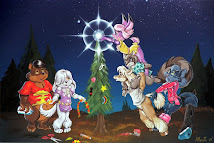There once was a field planted with the finest seeds of grain.
The sun shown down gentle and warm. The ground, freshly tilled, remained moist with the gentle washings of the rain.
Soon the spouts began to grow, bright and green, as they stretched toward the sun.
As the spouts grew, the weeds snaked their roots under the tilled soil and sprouted their own kind in the field.
Concerned for the grain, the field hands took action.
 They heated the plants hoping to scorch the weeds. Many wheat stalks withered. The ground became dry and bitter; roots were pulled up when the wind buffeted the field.
They heated the plants hoping to scorch the weeds. Many wheat stalks withered. The ground became dry and bitter; roots were pulled up when the wind buffeted the field.
The field hands spread poisons hoping to kill the weeds that way. The wheat itself also sickened, many stalks never gaining the head that grain reaches in its maturity.
As a last resort in their vendetta to kill the weeds, the field hands viciously attacked the field, cutting down stalks of wheat as well as weeds, leaving both to wither and die rootless on the side.
At last the weeds were gone. A fraction of the wheat remained in the field, ready to be harvested.
When the landowner arrived, he looked dismayed at the remaining wheat.
 His eyes tearfully moved to the piles of wheat cut and cast with the weeds on the side, the lines of wheat that had sickened and never matured, and the remnants of the wheat that were scorched so badly, they never had the chance to grow.
His eyes tearfully moved to the piles of wheat cut and cast with the weeds on the side, the lines of wheat that had sickened and never matured, and the remnants of the wheat that were scorched so badly, they never had the chance to grow.
"What became of the crops I planted?" he inquired of his field hands.
"The weeds had gotten into the field, Master. But don't worry," they added proudly. "We got rid of them."
The landowner wept bitterly...
The sun shown down gentle and warm. The ground, freshly tilled, remained moist with the gentle washings of the rain.
Soon the spouts began to grow, bright and green, as they stretched toward the sun.
As the spouts grew, the weeds snaked their roots under the tilled soil and sprouted their own kind in the field.
Concerned for the grain, the field hands took action.
 They heated the plants hoping to scorch the weeds. Many wheat stalks withered. The ground became dry and bitter; roots were pulled up when the wind buffeted the field.
They heated the plants hoping to scorch the weeds. Many wheat stalks withered. The ground became dry and bitter; roots were pulled up when the wind buffeted the field.The field hands spread poisons hoping to kill the weeds that way. The wheat itself also sickened, many stalks never gaining the head that grain reaches in its maturity.
As a last resort in their vendetta to kill the weeds, the field hands viciously attacked the field, cutting down stalks of wheat as well as weeds, leaving both to wither and die rootless on the side.
At last the weeds were gone. A fraction of the wheat remained in the field, ready to be harvested.
When the landowner arrived, he looked dismayed at the remaining wheat.
 His eyes tearfully moved to the piles of wheat cut and cast with the weeds on the side, the lines of wheat that had sickened and never matured, and the remnants of the wheat that were scorched so badly, they never had the chance to grow.
His eyes tearfully moved to the piles of wheat cut and cast with the weeds on the side, the lines of wheat that had sickened and never matured, and the remnants of the wheat that were scorched so badly, they never had the chance to grow."What became of the crops I planted?" he inquired of his field hands.
"The weeds had gotten into the field, Master. But don't worry," they added proudly. "We got rid of them."
The landowner wept bitterly...
Let those who have ears, hear.
~ESA

































